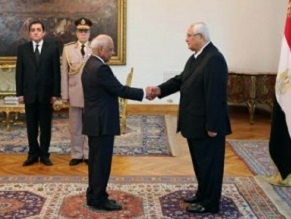|
World Jewish News

Egypt’s interim president Adly Mansour (right) shakes hands with Egypt’s caretaker Prime Minister Hazem al-Beblawi at the swearing in ceremony of Egypt’s interim cabinet on Tuesday.
|
EU Foreign Ministers called for Egyptian military to step down and allow ‘a transfer of power to a civilian-led and democratical
24.07.2013, Israel and the World EU Foreign ministers issued a united call for the ousted Egyptian President Mohammed Morsi’s release from political detention, at a meeting of the foreign affairs Council on Monday in Brussels, as they insisted the stalled transitioning Arab Spring state’s key priority must be prompt “free and fair elections”.
Morsi was forced from office shortly after his first anniversary as the country’s first-ever democratically-elected President earlier this month by the military, who had previously issued him with an ultimatum to acknowledge and respond to the widescale protest that coincided with his first anniversary in office, in reaction to Morsi’s perceived increasing grasp on power, or else it would intervene to restore order. An interim government has since been sworn in to power, apparently awaiting a second general election since 2011’s popular uprisings.
The council however expressed its concerns over the army’s intentions Monday, calling on it to step down from power and acknowledge that they “should not play a political role in a democracy”. “They must accept and respect the constitutional authority of civilian power as a basic principle of democratic governance. It is
now of utmost importance that Egypt embarks on a transition, allowing a transfer of power to a civilian-led and democratically elected government,” continued the conclusions released following the meeting of foreign representatives of all 28 EU member states.
The EU and international community in general had previously come under fire by close Morsi allies the Turkish administration, who criticised their apparent reticence in declaring the former Islamist leader’s ousting a military coup.
Calling for an inclusive political process in which “all political forces engage now in a process of reconciliation and trust building”, the council insisted the focus of efforts by all players in the fractured country must on bringing an end to ongoing violence and “to move rapidly to an inclusive democratic transformative process, including by the holding of democratic elections in the shortest possible time”.
Acknowledging Egypt’s significant economic crisis, which in itself prompted the widescale riots across the country earlier this month, amid claims the opposition group Tamarod that little had been done to bring stability to the country since Morsi was granted his mandate to rule, the council said the basis for securing stability across all public sectors was “an inclusive process which produces a democratically elected government responding to the legitimate aspirations of all the Egyptian people”, as it committed the EU’s help to this end.
EU foreign policy chief Catherine Ashton who chaired Monday’s crucial council meeting embarked on a one-day visit to Cairo last Wednesday where she met with members of the interim government in an effort to help propel the country’s democratic future. Deflecting criticism of the EU’s perceived inefficacy in response to the crisis, she broke widespread international silence on the issue of Morsi’s reported detention by the military as she called for his release along with all “political prisoners”.
In this regard, she insisted, the EU had been “very consistent: we have been strongly supportive of the people of this great country, we want to see Egypt move forward in its democratic future and we want to see that happen swiftly”. Emphasising her previous calls for an “inclusive process”, at the end of her talks with Egyptian interim President Adly Mansodur, interim Prime Minister Hezam Beblawy and Defence Minister General Abdel-Fattah El-Sisi as the transitional cabinet was official sworn in to office, as well as representatives of lead opposition group Tamarod which led protests to mark Morsi’s anniversary and members of the Freedom and Justice Party, she added that it was imperative for all Egyptians “to know that the future really is about ensuring that everybody can be engaged”.
Committing the EU’s support to helping secure Egypt’s future, amid widespread concern about the longterm security of democratic transition across the Arab world subject to 2011’s popular uprisings, she nevertheless rejected Turkey’s cautions of a domino destabilising effect emanating from Egypt, maintaining that “I have not heard anything that would suggest today that Egypt is going in any direction other than its own direction”.
by: Shari Ryness
EJP
|
|
